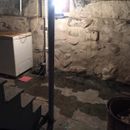How to insulate old rock& granite cellar?
We are doing a complete renovation to a 1780s era New England cape style home to modernize and bring is up to code. New walls and roof will be to energy code with no foam used and prefer not to use any foam insulation of any kind if possible.
Question: how to insulate cellar walls that are rock on first 2/3 and capped with granite blocks. House id post and beam construction. BTW cellar is wet most years, but has sump pump to keep level to floor only.
David
GBA Detail Library
A collection of one thousand construction details organized by climate and house part










Replies
This is a good article:
https://www.buildingscience.com/documents/insights/bsi-041-rubble-foundations
He advocates for spray foam. If you absolutely don't want to use foam, most other insulation requires a flat wall. One way to get that is to build a stud wall inside the stone basement wall and treat the stud wall like it's the exterior of your house. You need to carefully detail that wall where it meets the floor above.
In a basement you really want to use insulation that is unaffected by water. There's a lot of ways moisture can get into the insulation and essentially no drying action. If you're not considering foam, maybe rock wool?
dtcaswell,
Nick has given you good advice. All I would add is you might want to make addressing the water intrusion the first priority before moving on to insulating.
Irregular foundation walls like this are one of the niche applications where spray foam is about the only choice. Spray foam is fully adhered, so it doesn't leave any voids. You won't have a nice, flat finished service though (it's essentially impossible to get spray foam to cure like that), but it's not really any worse in that regard compared to the orginal wall surface. Bulk water -- a "wet wall" -- is still an issue though, and can cause seperation of the insulating layer over time. You really want to address water issues on the exterior, through a combination of rain gutters, grading the soil to slope away from the house, and waterproofing the exterior of the foundation wall.
If you really want to avoid any kind of foam, about the only safe way to go would be rigid mineral wool panels and an interior side wall such as Nick mentioned. I think such an assembly is still riskier for moisture and mold though compared to rigid foam or spray foam. You have to be careful when insulating below ground, because moisture is a constant concern.
Bill